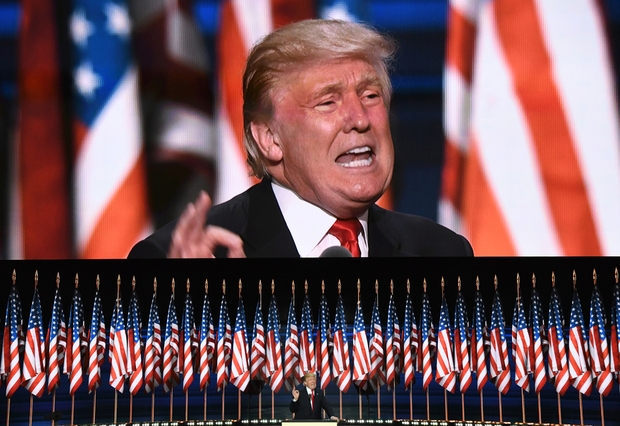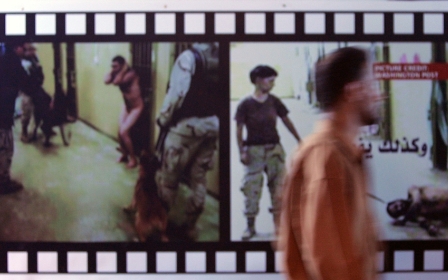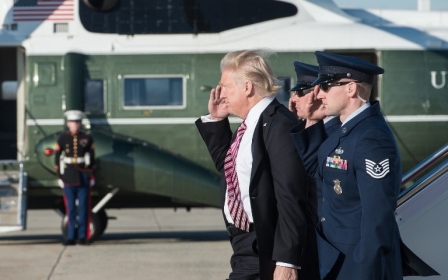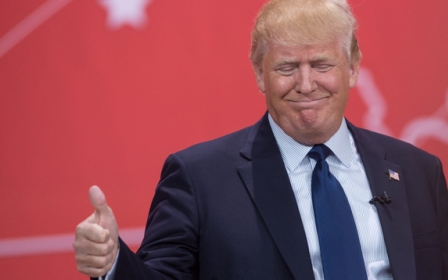Trump's next moves? Executive orders that could shape Middle East

President Trump's so-called Muslim ban is just one of many controversial executive orders in the pipeline, according to drafts which have emerged thanks to a wave of leaks from the US administration.
Orders relating to Iran, torture, Guantanamo Bay and the Muslim Brotherhood could fundamentally change the political landscape both locally and internationally, potentially impacting relations with the Middle East for years to come.
Many draft orders have been circulating in Washington only to be rejected or delayed by the Trump administration.
Designating the IRGC a terrorist organisation
Reuters on Tuesday reported that senior White House officials had mooted the potential for Trump to designate the Iranian Revolutionary Guard Corps (IRGC) a terrorist organisation.
The IRGC, which is arguably the single most powerful political and military institution in Iran, has large stakes in the Iranian economy and answers directly to Supreme Leader Ali Khamenei.
If the designation is implemented it would add to measures the United States has already imposed on individuals and entities linked to the IRGC.
Designating the guards as a terrorist organisation could have a disastrous effect on the Iranian economy due to its involvement in major sectors including transportation and oil.
The US government official told Reuters that sanctions against the IRGC would be done to "turn up the heat" and dissuade foreign investment in Iran's economy.
Sanctioning the IRGC, however, could backfire as it could encourage Iranian-backed forces in Iraq and Syria to curtail any action against Islamic State and perhaps spark actions against US-backed or even American forces in Iraq, Syria and in Yemen.
Sending IS detainees to Gitmo
The New York Times revealed that the Trump administration drafted plans to make Guantanamo Bay bigger to house militants linked to the Islamic State group.
Former president Obama tried to close the controversial offshore prison camp, which has housed suspected terrorists linked to Al-Qaeda since 9/11, following widespread reports of abuse of inmates and negative global publicity around the facility.
The draft order obtained by the New York Times also mentions the International Red Cross being banned from visiting detainees in Guantanamo Bay and the possibility of denying detainees the opportunity for a fair trial.
National security officials and legal scholars had warned the Trump White House from following through with this controversial order, as it will undermine efforts to combat militant groups.
Banning Muslim Brotherhood
Proposals to ban the Muslim Brotherhood have long been discussed in Washington by right-wing lobby groups and politicians.
Republican Senator Ted Cruz introduced legislation that would designate the Muslim Brotherhood a terrorist organisation, a move supported by key advisers to Trump.
The Obama administration resisted pressure from Republican lawmakers, as well as the governments of the United Arab Emirates and Egypt, to implement it.
Stephen Bannon, the former head of Breitbart news and now a chief strategist in the White House, has in the past described the Brotherhood as "the foundation of modern terrorism."
If a ban was implemented by the Trump administration, it could lead to a rift with numerous countries including Tunisia and Turkey, where groups affiliated to the Brotherhood have strong links to ruling political parties.
Plans to ban the Brotherhood could also have a disastrous impact on Muslim organisations in America.
Shadi Hamid from the Brookings Institute described a ban on the Brotherhood as being used as a "smokescreen" to target American Muslims and American Muslim organisations.
Imam Omar Suleiman, a professor of Islamic Studies at Southern Methodist University in Dallas, said Trump was pandering to the idea "there are secret cells of Muslims trying to take over the country".
Reopening CIA 'black sites' prisons
Following Trump's comments to media that "torture works", fears have arisen that torture could be reinstated as official US policy after draft orders were circulated to reopen CIA black site prisons.
However in the most recent version of the draft order on the treatment of terrorist detainees, the reopening of black site prisons was dropped, according to a text leaked to the New York Times.
Trump has been a keen advocate of waterboarding and has praised the use of torture in numerous interviews following his inauguration.
Black site prisons on foreign soil were outlawed under the Obama administration. Under his predecessor George W Bush, detainees were "rendered" to third country security services where they proceeded to torture them.
Kate Taylor, the deputy director at international human rights organisation Reprieve, described Trump's proposals as damaging US interests.
“The CIA’s secret prison programme was one of the most shameful chapters in recent US history," she said.
"It saw men, women and even children kidnapped, abused and ‘rendered’ to dungeons around the world – causing untold damage to America’s reputation and security."
New MEE newsletter: Jerusalem Dispatch
Sign up to get the latest insights and analysis on Israel-Palestine, alongside Turkey Unpacked and other MEE newsletters
Middle East Eye delivers independent and unrivalled coverage and analysis of the Middle East, North Africa and beyond. To learn more about republishing this content and the associated fees, please fill out this form. More about MEE can be found here.




